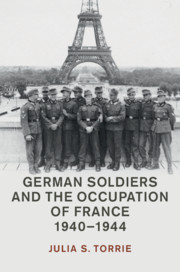Refine search
Actions for selected content:
15418 results in Military history
17 - Universal peacekeepers?
- from Part 4 - The Howard Government’s missions
-
- Book:
- The Limits of Peacekeeping
- Published online:
- 13 April 2019
- Print publication:
- 10 October 2018, pp 463-479
-
- Chapter
- Export citation
Index
-
- Book:
- The Limits of Peacekeeping
- Published online:
- 13 April 2019
- Print publication:
- 10 October 2018, pp 628-648
-
- Chapter
- Export citation
15 - To the Caribbean
- from Part 3 - The Keating Government’s last missions
-
- Book:
- The Limits of Peacekeeping
- Published online:
- 13 April 2019
- Print publication:
- 10 October 2018, pp 433-448
-
- Chapter
- Export citation
4 - ‘The unforgiving school of trial and error’
- from Part 1 - Somalia
-
- Book:
- The Limits of Peacekeeping
- Published online:
- 13 April 2019
- Print publication:
- 10 October 2018, pp 80-116
-
- Chapter
- Export citation
7 - ‘Our name would not be worth much … if we turned tail’
- from Part 1 - Somalia
-
- Book:
- The Limits of Peacekeeping
- Published online:
- 13 April 2019
- Print publication:
- 10 October 2018, pp 175-198
-
- Chapter
- Export citation
Appendix A - Key United Nations Security Council resolutions
-
- Book:
- The Limits of Peacekeeping
- Published online:
- 13 April 2019
- Print publication:
- 10 October 2018, pp 571-572
-
- Chapter
- Export citation
11 - Mandate meets reality
- from Part 2 - Rwanda
-
- Book:
- The Limits of Peacekeeping
- Published online:
- 13 April 2019
- Print publication:
- 10 October 2018, pp 302-340
-
- Chapter
- Export citation
10 - Increasingly unwelcome guests
- from Part 2 - Rwanda
-
- Book:
- The Limits of Peacekeeping
- Published online:
- 13 April 2019
- Print publication:
- 10 October 2018, pp 267-301
-
- Chapter
- Export citation

Bombing the City
- Civilian Accounts of the Air War in Britain and Japan, 1939–1945
-
- Published online:
- 01 October 2018
- Print publication:
- 18 October 2018

German Soldiers and the Occupation of France, 1940–1944
-
- Published online:
- 24 September 2018
- Print publication:
- 11 October 2018
Chapter 1 - “Jim Crow on the Run”
-
- Book:
- African Americans and the Pacific War, 1941–1945
- Published online:
- 10 September 2018
- Print publication:
- 20 September 2018, pp 21-57
-
- Chapter
- Export citation
Chapter 6 - Liberators and Occupiers
-
- Book:
- African Americans and the Pacific War, 1941–1945
- Published online:
- 10 September 2018
- Print publication:
- 20 September 2018, pp 219-253
-
- Chapter
- Export citation
Figures
-
- Book:
- African Americans and the Pacific War, 1941–1945
- Published online:
- 10 September 2018
- Print publication:
- 20 September 2018, pp ix-x
-
- Chapter
- Export citation
Dedication
-
- Book:
- African Americans and the Pacific War, 1941–1945
- Published online:
- 10 September 2018
- Print publication:
- 20 September 2018, pp v-v
-
- Chapter
- Export citation
Index
-
- Book:
- African Americans and the Pacific War, 1941–1945
- Published online:
- 10 September 2018
- Print publication:
- 20 September 2018, pp 277-290
-
- Chapter
- Export citation
Chapter 2 - The Segregated South Seas
-
- Book:
- African Americans and the Pacific War, 1941–1945
- Published online:
- 10 September 2018
- Print publication:
- 20 September 2018, pp 58-94
-
- Chapter
- Export citation
Conclusion
-
- Book:
- African Americans and the Pacific War, 1941–1945
- Published online:
- 10 September 2018
- Print publication:
- 20 September 2018, pp 254-260
-
- Chapter
- Export citation
Chapter 4 - Nourishing the Tree of Democracy
-
- Book:
- African Americans and the Pacific War, 1941–1945
- Published online:
- 10 September 2018
- Print publication:
- 20 September 2018, pp 136-175
-
- Chapter
- Export citation
Introduction
-
- Book:
- African Americans and the Pacific War, 1941–1945
- Published online:
- 10 September 2018
- Print publication:
- 20 September 2018, pp 1-20
-
- Chapter
- Export citation
Epigraph
-
- Book:
- African Americans and the Pacific War, 1941–1945
- Published online:
- 10 September 2018
- Print publication:
- 20 September 2018, pp vi-vi
-
- Chapter
- Export citation
